Fertility supplements for both men and women are used to boost the chance of conceiving via different pathways. As such, they come in a wide variety of different forms and ingredients. Different kinds of supplements can sometimes target completely different metabolic pathways to increase fertility, such as folic acid and acetyl l-carnitine (1).
Some of the most common fertility supplements are folic acid, vitamin C, vitamin E, and acetyl L-carnitine. Acetyl L-carnitine has a positive effect on women’s fertility through its antioxidant effect, reducing inflammation and helping the chances of a successful pregnancy (2, 3, 4, 5, 6, 7).
Best Fertility Supplements
1. Concepta Solutions Women’s Fertility Boost
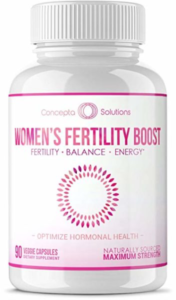
These easy to swallow pills pay attention to all of the minor vitamins, nutrients, and amino acids that benefit reproductive health without going overboard on the amount contained in each dose. Some of the additional ingredients contained include zinc, niacin, and riboflavin.
The entire formula is vegan and made from non-GMO ingredients, ensuring fewer unnatural chemicals find their way into the body. For these reasons, it’s our #1 pick.
2. Concepta Solutions Men’s Fertility Boost
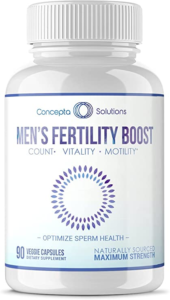
Concepta Solutions Men’s Fertility boost is an east to take pill supplement that utilizes vegan ingredients to raise testosterone and improve healthy sperm production.
Men require a broad range of vitamins and minerals to maintain reproductive health, and this supplement does not skip any of them. Each one can be found on the ingredient list combined with natural boosters like ashwagandha and Chinese herbal remedies.
3. Everett Laboratories Pregnitude
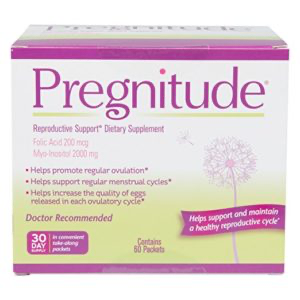
Everett Laboratories Pregnitude goes all in and focuses on boosting folic acid and Myo-Inositol – two elements many women are lacking in their regular diets. This fertility supplement powder can be mixed into shakes, smoothies or even just water.
Pregnitude is ideal for women who are already taking vitamins and would like the extra boost to their reproductive health.
4. Pink Stork Fertility
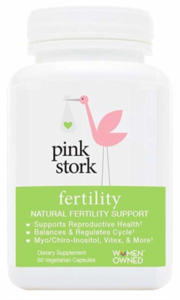
This product contains all of the essential ingredients identified by scientists to improve hormone production, including vitamin e, folic acid, and iron. Also, this is one of the only fertility aids designed to regulate ovulation cycles, making it simpler for women to identify their fertile days for conception.
After conception, the vitamins can provide required nutrition to foster implantation in the uterine lining.
5. Eu Natural Conception Fertility Prenatal Vitamins
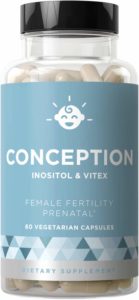
Women have so many factors that can affect their fertility, which is why Eu Natural Conception Fertility Prenatal Vitamins are not taking any chances. This easy to swallow vitamin contains almost every nutrient and vitamin known to boost reproductive health.
One of the benefits of these is that they are soft gel pills that are easier to consume with a regular drink. They are 100% vegetarian and do not include any wheat, gluten, or dairy that could make a hopeful mother-to-be sick.
6. Eu Natural Male Conception Fertility Vitamins
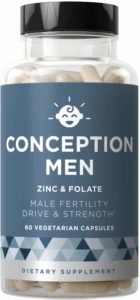
The majority of important ingredients for male reproductive health, such as riboflavin, folate, and zinc. are included in these pills. They are also 100% vegetarian and made of an easy to swallow gel, that doesn’t contain any fillers.
These are strongly recommended for someone seeking a natural boost to their sperm production and motility.
7. Conquer Premium Fertility Supplement for Men
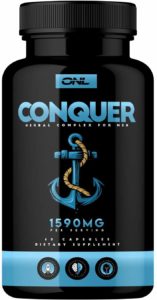
These Conquer Premium Fertility Supplements for Men are ideal for the guy who wants to improve reproductive success by increasing sperm production and motility.
Various herbal ingredients are also included to improve strength, stamina, and sex drive, giving men the energy they need to focus on helping their partner get pregnant.
8. Premama Fertility Supplement Blend for Women
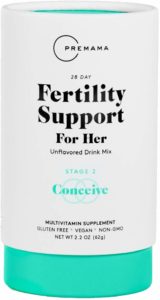
The Premama Fertility Supplement Blend for Women is an easy to use drink mix that combines myo-inositol and folic acid. It is one of the only products deliberately designed to be soft on the stomach.
It is also the winner of the 2016 New Hope Network’s NEXTY Award for Best New Supplement Delivery Format and of the 2015 SupplySide Editor’s Choice Award in Women’s Health Category.
9. Blue Stork Male Fertility Support

Similar to the Pink Stork for women, this Blue Stork Male Fertility Support focuses on including the most significant nutritional supplements necessary to boost male reproductive health and sperm production.
The main ingredients are zinc, folate, maca root, L-Carnitine, and horny goat weed. There is no gluten, GMOs, preservatives, or other unwanted elements.
10. Gaia Herbs Vitex Berry Capsules
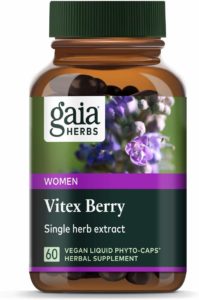
Gaia Herbs Vitex Berry Capsules focus on regulating and strengthening a woman’s natural ovulation cycle, making it easier to predict fertile periods.
This fertility supplement helps improve estrogen production, and all ingredients are non-GMO and tested for purity before being used in the capsules.
How We Rank
The first thing we looked at was ingredient. For women, the ideal product contains folic acid, vitamin C, vitamin E, and acetyl L-carnitine. Meanwhile, men require something that boosts vitamins C and E, and the best supplements contain a herb called ashwagandha. Ashwagandha, also known as Indian Ginseng, has been proven to increase male fertility by 167% over 90 days when taken regularly. This is why you’ll find Concepta Solutions Men’s Fertility Boost ranked number 2 overall, and number 1 for men.
Out of all of the vitamins, E and C are the most important for both genders, so supplements that contained high amounts of them, like Pink Stork and Eu Natural Conception Fertility, were favored. For women, the presence of both folic acid and Myo-Inostitol were essential since they are often lacking their diets. This is why Everett Laboratories Pregnitude was ranked third overall.
For men, it was important to include ingredients like zinc since it has a direct correlation on testosterone production, libido and overall sexual health – all important factors to manage when trying to conceive. This is why Eu Natural Male Conception Fertility Vitamins made it on our list.
Lastly, we looked at the dosages for each ingredient in the supplements left. Unfortunately it’s common practice for many companies to under-dose specific ingredients to boost profit margins. Supplements like Concepta Solutions Women’s Fertility Boost ranked highly because the company ensured the dosage level of individual ingredients were at clinically effective dosages.
Benefits
1. Fertility supplements with inositol can significantly increase ovulation and fertility rates. The fertility supplement myo-inositol is a vitamin B complex taken for fertility, pregnancy, and PCOS. Polycystic Ovary Syndrome is a condition affecting women which can cause hormonal imbalance, irregular periods, and infertility. Women suffering from this condition may find some relief from fertility issues in a combination of inositol and folic acid supplements, according to preliminary research (8, 9).
One 2015 study included 50 anovulatory PCOS patients with insulin resistance. All of them received myo-inositol during three spontaneous cycles. If patients remained anovulatory or no pregnancy was achieved, a combination of myo-inositol and clomiphene citrate was used in the next three cycles. Ovulation and pregnancy rate, changes in body mass index (BMI) and homeostatic model assessment (HOMA) index and the rate of adverse events were assessed. The study showed that 4 grams of inositol and 400mcg of folic acid induced ovulation in 62% of participants treated with the regimen daily (10).
2. Fertility supplements with pomegranate can protect the embryo. Pomegranate seed extract contains about 16% beta-sitosterol, which has been connected to the protection of embryos in mice. Additionally, the juice of pomegranate may increase both the concentration and motility of sperm (11).
3. Fertility supplements can help combat anemia. When the blood does not get enough iron, anemia, or an insufficient number of red blood cells, may develop. Since it is these red blood cells that deliver oxygen to all of the body’s tissue and organs including the ovaries and uterus, this deficiency may cause the eggs stored in the ovaries to weaken over time and become unviable.
Worse yet, should conception occur, anemia makes it impossible for the growing fetus’ cells to divide and grow properly. This may result in a miscarriage in some cases.
A 2014 report in the International Journal of Current Research and Academic Review found that “women who do not get sufficient amounts of iron may suffer anovulation (lack of ovulation) and possibly poor egg health, which can inhibit fertility at a rate 60% higher than those with sufficient iron stores in their blood.” (12).
Luckily a variety of fertility supplements can combat this. Folic acid is one that can help potential mothers who suffer not just from low fertility, but also from anemia (13).
Multiple studies show overwhelming evidence in favor of vitamin C supplementation as a treatment for anemia (14, 15).
Other studies, however, contend that anemia is a complex issue and while vitamin C supplementation may help solve part of the problem, anemia can also be linked to low levels of vitamin B12 and vitamin A, among other essential nutrients and minerals (16).
4. Fertility supplements with maca root can improve libido. There is a popular plant food originating from central Peru called Maca root. This root has been traditionally used as an aphrodisiac. Several studies have shown a link between 1.5 to 3 grams of dried Maca root and self-reported increase in libido (17, 18).
5. Fertility supplements with vitamin E can help with IVF. Both men and women have been shown to experience increased fertility when given the powerful antioxidant vitamin E. Fertilization rates increased from 19% to 29% when men going for IVF treatments with their partners were given vitamin E supplements. This is likely due to the effects of antioxidants on male fertility discussed in the above section on vitamin C.
6. COQ10 may increase fertility in both men and women. As discussed above, oxidative stress is a leading cause of both male and female infertility, affecting both sperm and egg quality (19, 20).
It has even been shown to cause damage to the DNA in sperm cells, potentially resulting in both infertility and recurring pregnancy loss (21).
Dietary antioxidants, including CoQ10, have been found to reduce oxidative stress and improve fertility in both sexes. Daily supplementation of 200 to 300mg of CoQ10 has been associated with increased sperm count, density, and motility (22).
This supplement can also improve female sexual health by stimulating ovarian response and slowing ovarian aging (23).
Doses ranging from 100mg to 600mg have been shown to have beneficial effects on fertility (24).
7. The fertility supplement, acetyl l-carnitine, seems to improve energy and metabolism when taken. Some studies have shown that acetyl l-carnitine has a positive effect on metabolism in animal trials such as those on rats, especially in the brain (25).
Furthermore, L-carnitine as a molecule is, largely speaking, important to the way that human bodies metabolize fatty acids (26).
Defects in the way your body uses L-carnitine as a transporter for fatty acids can be linked to certain chronic diseases, such as hypoglycemia (27).
That isn’t just true for L-carnitine, either. Low levels of vitamin E have been linked to stunted growth and anemia, as well as poor outcomes for both children and mothers during pregnancy (28).
8. Some fertility supplements may help relieve pain during sex. Science shows that women and men tend to have markedly different responses to the sensation of sex, especially when it comes to pain. A large body of current research seems to show that women actually experience more pain and respond to it more than men do (29).
Some research suggests that this may be due not only to hormone levels in the body but also to certain psychological or social factors underpinning sex and gender. Some types of fertility supplements, such as vitamin D, are used not necessarily to increase sperm count or egg stability, but actually to decrease any pain associated with sex (30).
9. Fertility supplements with iron are important for ovulatory infertility. Consuming iron supplements and non-heme iron, which comes from plant-based foods, may decrease the risk of ovulatory infertility. An observational study including 438 women found that taking iron supplements was linked to a 40% lower risk of ovulatory infertility (31).
However, non-heme iron was also associated with a decreased risk of infertility. Heme iron, which comes from animal sources, did not appear to affect fertility levels.
10. Fertility supplements such as folic acid, can help prevent neural tube defects in newborn children. One of folic acid’s most well-known roles is as a pregnancy supplement to help facilitate safe births and healthy children. An intake of at least a few milligrams per day is a recommendation issued worldwide to all pregnant women, not just those living in the United States (32).
Supplementation by folic acid helps prevent neural tube defects (NTDs), or problems in the way a newborn’s spine, spinal cord or brain are formed (33).
Taking folic acid as a pregnant woman can ensure not just fertility but also a healthy birth.
11. Fertility supplements may help protect cognitive function and treat neural disorders. This effect has already been shown in multiple animal trials, especially on rats. Acetyl l-carnitine seems to protect the brain against changes that happen as a result of aging, such as a lowering in the brain’s normal antioxidant defenses and a change in the way mitochondria work (34).
12. Fertility supplements with antioxidants, can help improve conception. Antioxidants help fertility by deactivating free radicals in your body, which can damage both sperm and egg cell.
One study that followed 60 couples undergoing in-vitro fertilization found that taking an antioxidant supplement resulted in a 23% greater chance of conception (35).
Foods such as fruits, vegetables, nuts and grains are packed full of beneficial antioxidants like vitamins C and E, folate, beta-carotene and lutein.
Vitamin C is also well known for its status as an antioxidant supplement. It may play a role in the prevention of chronic diseases such as atherosclerosis and possibly even cancer (36).
Evidence points towards vitamin C as an agent that protects against aging and the invasion of the body by foreign pathogens (37).
13. Fertility supplements from bee’s help improve conception. A study of women with endometriosis found that taking bee propolis twice a day resulted in a 40% greater chance of becoming pregnant after 9 months (38).
Royal jelly, which is also made by bees, is packed with amino acids, lipids, sugars, vitamins, fatty acids, iron and calcium. Animal studies found it may improve reproductive health in rats (39, 40).
14. Fertility supplements may help in preventing cancer. Folic acid has also been shown to have some potential as a cancer treatment. Though evidence as of yet is still relatively inconclusive, small or regular amounts of folate may actually help with protecting against cancer (41).
Folate supplementation might reduce the risk of esophageal cancer, pancreatic cancer, and gastric cancer, for example (42).
Results from one 2017 study even indicated that specific daily doses of folate might reduce the risk of esophageal cancer by a significant 12% (43).
15. Fertility supplements can help your immune system by aiding white blood cells. Vitamin C has a positive effect on the way your immune system fights infections, meaning it’s also good for potential mothers who want to ward off the winter flu as it’s going around. It’s an essential nutrient that contributes to the immune system by protecting against pathogens and increasing antioxidant effects, fighting against the oxidative stress (inflammation) which occurs as a result of infections (32).
Other studies show that large doses of vitamin C may help put an end to respiratory infections such as the common cold, helping patients recover more quickly (44).
Side effects
1. Taking high doses of certain supplements, such as vitamin C, may lead to unintended side effects, such as nausea or headaches. Vitamin C is touted as one of the healthiest and most natural supplements you can take, as it’s simply an essential vitamin that your body needs, but it doesn’t come without its health risks.
While only limited research has been done on the possible side effects of vitamin C supplementation, experts believe that some people who take it may experience a mild form of nausea or diarrhea. In addition, it may interfere with other kinds of preexisting health conditions and medications, so check with your doctor first before starting a regimen of vitamin C treatment to solve fertility problems (45).
2. Taking too much folic acid has been linked to increased risks for heart disease and for cancer. While folate deficiencies have been linked to an increased risk of cancer, taking too much folic acid can actually do the exact same thing. Oversupplementation and high doses of folate have been posited as a possible risk factor for cancer, though a causative relationship has yet to be proven (46).
It should be noted that these unpleasant side effects aren’t necessarily associated with normal levels of folate or regular supplementation of folic acid, only with excessive usage. As such, using correct doses is very important for those taking folic acid as a fertility supplement.
Recommended Dosage
As with any dietary supplement, it is important to always take the correct dosages. The proper dosage of a supplement, of course, varies depending on what supplement is in question and on what condition is being treated.
Myo-inositol is an effective treatment for polycystic ovarian syndrome in doses ranging from 200 to 4,000mg daily (with higher doses yielding higher efficacy). The soft gel form of this supplement is more potent than the powdered form and requires only 30% of the dose. For example, the psychopharmacological effects of this supplement present themselves at 14 to 18g doses; a similar effect can be seen at only 4.2 to 5.4g of soft gel formulations.
DHEA appears to be an effective supplement in persons over the age of 40 and in doses ranging from 25 to 50mg. Prolonged usage at doses as high as 100mg seems to be safe, as well. Younger people have used DHEA to enhance levels of testosterone. While the dosage in this context is not perfectly clear, approximately 200mg seems to be what tends to be used.
A standard dose of vitamin D is between 2 and 3 grams daily. Some research has suggested that a true upper limit for the safe use of vitamin D may be around 10,000IU/day. Most people can meet their needs for moderate supplementation of vitamin D with a dose of 1,000 to 2,000 IU (which is the lowest effective dosage range). Cholecalciferol (D3) is preferred over ergocalciferol (D2) because of its greater efficacy in the human body. Vitamin D should always be taken with food.
100mg to 200mg is the recommended daily intake (RDI) for vitamin C.
As a daily preventative, a dosage range of 5 to 10mg is sufficient for zinc supplementation. If, however, the patient is at risk for a zinc deficiency the dose should be increased to 25 to 45mg.
CoQ10 relies on food for absorption and has a dosage range of 90 to 200mg daily.
The standard dose for maca is 1,500-3,000mg and should also be taken with food. You can eat the root itself or supplement with water or ethyl acetate-based extract.
A standard dosage for ashwagandha is 300 to 500mg. This supplement needs to be taken with meals.
Vitamin E supplementation is unnecessary in many cases due to the ease of acquiring it through a regular, healthy diet. The effective dose for maintaining adequate levels of vitamin E is quite small, only 15mg or 22.4IU.
Assuming a 60% saponin extract, the standard dosage for Tribulus ranges from 200 to 450mg daily when used to enhance libido.
FAQ
Will my fertility supplements interfere with other medications? Though drug interactions with most popular fertility supplements aren’t quite as severe as, say, taking two different kinds of prescription drugs at the same time may be, it’s also something one should definitely check with a doctor about.
Folic acid, for instance, can occasionally interfere with medications used to treat parasitic infections. Folic acid is an essential component for malarial infections, and having too much in your body due to a supplement may just make the condition worse if you inadvertently take a supplement at the same time (47).
Are fertility supplements safe? For the most part, common fertility supplements like Vitamin C, Vitamin D, and folic acid are well-tolerated, and users won’t have to worry about any particularly serious side effects as long as they’re using normal dosages at the correct intervals.
However, like any other kind of supplement, taking particularly high doses of fertility supplements can be unsafe. If you suffer from some kind of chronic health condition, especially one that you regularly take medication for, or if you think you might have an allergy to any ingredients used in a fertility supplement you are considering, it’s best to consult with your doctor beforehand.
How well-established is the research on the effectiveness of fertility supplements? This is one area of controversy, where researchers seem to differ. Some studies show significant fertility increases based on such supplementation. Even common multivitamins have been posited as an effective means of preventing infertility in women (48).
On the other hand, some scientists think that supplements are not necessarily an effective means of increasing fertility and that studies which show them as being effective have flaws in their experimental design.
Other researchers think that fertility supplements and vitamins have a measurable impact on male fertility, but that where or not there is any improvement in female fertility is less clear. In short, despite a large and growing body of research, the jury is still out. Taking fertility supplements may help if you have issues with fertility, but it may also be a relative long shot.
Can I take two different kinds of fertility supplements at once? While it’s technically possible to take two different kinds at once, it’s not necessarily advisable, as high levels of two different supplements may combine in strange ways. If you’re considering taking two different fertility supplements at once, you should probably start with small doses of one and slowly work your way up, until you’re sure you have no adverse reactions to the first. Once that is done, a second supplement can be added into your diet slowly, with confirmation from a health professional that there are no adverse reactions.
Are fertility supplements primarily for men or for women? Fertility supplements are available for both men and for women. Supplements for men may increase sperm count, for example, while supplements for women increase the chances of an egg becoming fertilized. Some supplements, such as folic acid, can be used by both men and women with slightly different effects. If fertility is an ongoing issue, such supplements may be used by both parties in a relationship to further increase the chances of fertilization.
Is it possible to overdose on fertility supplements? While it isn’t necessarily possible to overdose on the fertility-assisting part of fertility supplements, it is definitely possible to suffer from severe side effects as a result of taking too many supplements or in doses that are too large. Taking abnormally high doses of folic acid, for example, may be a risk factor for certain kinds of cancer, including prostate cancer (49).
Should I talk with my doctor before starting a new course of fertility supplements? Yes. While fertility supplements generally aren’t particularly strange or dangerous they may interfere with existing medication you’re on or trigger an allergy that you didn’t know you had. There may also be undiagnosed issued that could be aggravated by new supplements. As such, new users should always consult a medical professional beforehand.
Is there an age limit on starting fertility supplements? While there is no age limit on starting or stopping fertility supplements, men and women may notice diminishing returns as they age and fertility becomes a naturally more difficult process. Inf act, the woman’s age at the time of possible pregnancy is the single most important factor in fertilization, even over the age of the male partner (50).
Having children is the easiest and the most risk-free, while women are in their twenties. That said, fertility treatments are literally meant to increase the chance of a successful pregnancy, even if you’re slightly older than you would prefer, so don’t necessarily let age discourage you.
What is the best way to improve sperm quality? One of the most overlooked strategies to improve sperm quality is improving your antioxidant levels. A study published in the Journal of Andrology found that nutrients with antioxidant properties like selenium and vitamin E, had significant benefits on sperm health and quality among a group of infertile men (53).
Other research published in 2010 by researchers at a fertility clinic in Spain found that vitamin C intake was protective against having fertility problem (52).
Recap
In short, a whole range of benefits can be attributed to different fertility supplements.. Not only do they improve fertility, reduce pain during sex, and improve the movement and count of sperm in men; they also in many cases benefit the body in other ways, such as preventing against anemia, acting as antioxidants that fight aging and chronic disease, and preventing iron deficiencies.
Also, keep in mind that fertility and libido usually go hand in hand with your general health. For this reason, anything that improves your overall health (like exercise and healthy eating) is likely to boost your fertility at the same time.
For Healthtrends #1 fertility supplement recommendation, click here.
